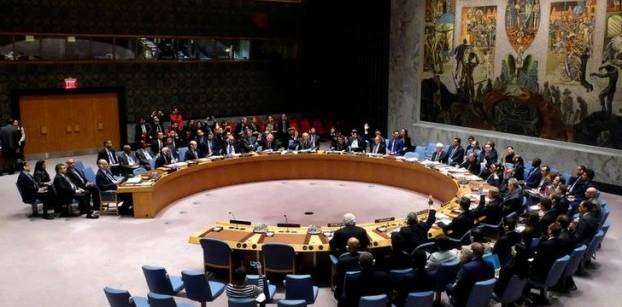Egypt slams Guardian for 'factual mistakes' on Cairo’s stance on Syria

UN Security Council meeting on situation in Syria (Reuters)
CAIRO, Oct 24 (Aswat Masriya) - Egypt’ ambassador to the UK criticised The Guardian for publishing a recent article that attacked Cairo’s position towards the situation in Syria, saying it contained “factual mistakes”.
An article titled “Iran 'wanted Egypt at Syria talks' as Middle Eastern alliances shift” published by The Guardian on Oct. 20 claimed that Egypt voted for a Russian UN Security Council resolution on Syria to block a draft French resolution, “which had demanded an end to airstrikes on Aleppo and military flights.”
Egypt’s ambassador to London Nasser Kamel wrote a letter that was published by foreign ministry on Sunday, where he expressed his "astonishment" from the article, and refuted “some of [its] obvious and factual mistakes”.
“Egypt voted in favor of that [French] resolution (as well as for the Russian draft resolution due to what we view as common elements shared by both drafts),” the letter by Nasser read.
Earlier in October, Egypt voted for two rivals resolutions, one drafted by Russia, known for its support of Syria's President Bashar al-Assad, and the other by Spain and France; a move that has sparked an online backlash against Egyptian authorities.
Egypt shrugged off criticism for its decision, saying it backs all efforts aimed at stopping the Syrian people’s tragedy, and explaining it voted for both resolutions as they both called for a ceasefire.
Russia vetoed the French-drafted resolution, which called for grounding military aircraft in Aleppo and unhindered humanitarian access to besieged areas in Syria. Meanwhile, Moscow’s draft, which excluded a demand for an end of air strike on Aleppo, failed to get a minimum of nine votes in favor.
The Egyptian ambassador also said the article presented a “false theory” by creating a link between Egypt’s vote in favour of the Russian draft resolution and the decision of Saudi state-owned oil company Aramco to temporarily suspend its oil supplies to Egypt for October 2016.
Only two days after the voting, Aramco announced the suspension of its petroleum product supply to Egypt for October, with several observers saying that the sudden halt decision has a political dimension, following Egypt's vote for the Russian-backed draft resolution.
Kamel however denied these speculations and referred to a statement issued by the Egyptian Ministry of Petroleum Tarek El-Molla at the beginning of October that indicates that Aramco’s decision was made prior to the voting.
Kamal said that his observations should be taken into account if The Guardian is looking to “change” or “alleviate” the prevailing perception in Egypt about the paper being “biased and lacking objectivity” in its coverage of the events in Egypt.
The ambassador said he expects a “leading” newspaper as The Guardian to publish his response to their article.
Earlier this year, Egypt's foreign ministry slammed articles by The Economist and Bloomberg that criticised Egypt’s economic and political state and the management of President Abdel-Fattah al-Sisi.









facebook comments